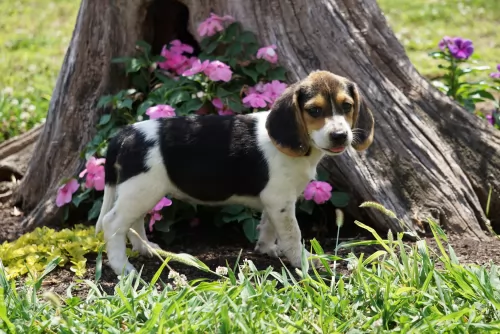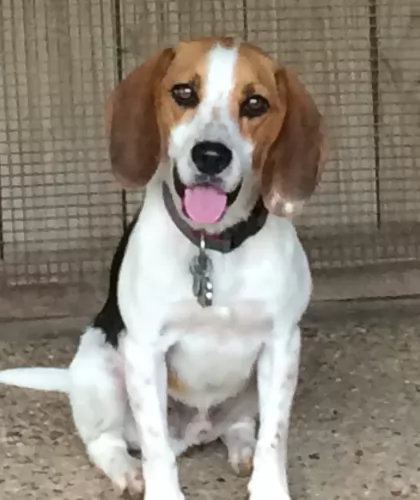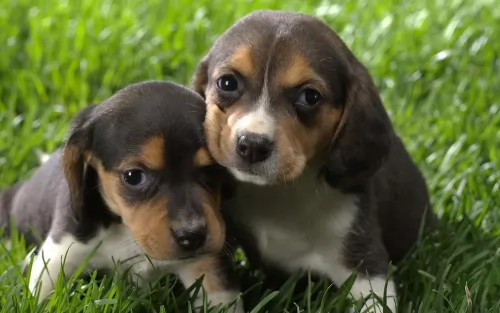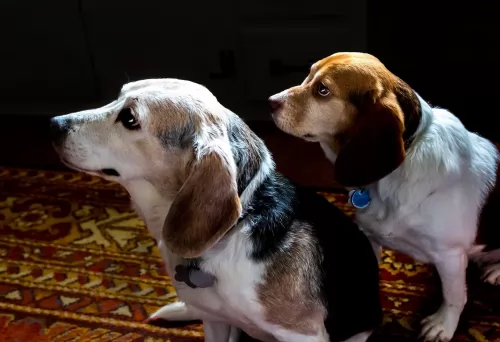 Petzlover
Petzlover Beagle is originated from United Kingdom but Pyrenean Mastiff is originated from Spain. Beagle may grow 41 cm / 16 inches shorter than Pyrenean Mastiff. Beagle may weigh 89 kg / 196 pounds lesser than Pyrenean Mastiff. Both Beagle and Pyrenean Mastiff has almost same life span. Both Beagle and Pyrenean Mastiff has almost same litter size. Both Beagle and Pyrenean Mastiff requires Low Maintenance.
Beagle is originated from United Kingdom but Pyrenean Mastiff is originated from Spain. Beagle may grow 41 cm / 16 inches shorter than Pyrenean Mastiff. Beagle may weigh 89 kg / 196 pounds lesser than Pyrenean Mastiff. Both Beagle and Pyrenean Mastiff has almost same life span. Both Beagle and Pyrenean Mastiff has almost same litter size. Both Beagle and Pyrenean Mastiff requires Low Maintenance.
 There are some accounts of similar size dogs used for hunting in Greece in 5th century BCE. During 8th century the Talbot Hound breed was created. In 11th century Talbot Hound was brought to England by William the Conqueror. While using in hunting they are found to be a slow runner. To overcome the situation and increase their running speed the hunting people bred Talbot Hound with Grey hounds. The beagles described earlier were very small in size and are said as pocket beagles.
There are some accounts of similar size dogs used for hunting in Greece in 5th century BCE. During 8th century the Talbot Hound breed was created. In 11th century Talbot Hound was brought to England by William the Conqueror. While using in hunting they are found to be a slow runner. To overcome the situation and increase their running speed the hunting people bred Talbot Hound with Grey hounds. The beagles described earlier were very small in size and are said as pocket beagles.
 The Pyrenean Mastiff originates from Spain, descending from ancient livestock guardian-type dogs.
The Pyrenean Mastiff originates from Spain, descending from ancient livestock guardian-type dogs.
They have always been used as guardians, looking out for livestock and warding off predators.
When you do research you find that there is little information on the exact origins of the dog. It was only in recent years that the dog was taken out of its native region and sent to the USA, but it isn’t recognized by the AKC.
The dog was however recognized by the FCI in 1982.
 They are small and compact breed, and always happy and fun loving. They should be trained by patient and creative training techniques. Beagles are very much interested in using their nose in finding interesting scents and are food focussed. They always wake their neighbours at 6 am by their half howling. They think everyone is their best friend and love to have friendship with other animals and humans. They have about 220 million scent receptors and are said as "a nose with feet" by humorist Dave Barry.
They are small and compact breed, and always happy and fun loving. They should be trained by patient and creative training techniques. Beagles are very much interested in using their nose in finding interesting scents and are food focussed. They always wake their neighbours at 6 am by their half howling. They think everyone is their best friend and love to have friendship with other animals and humans. They have about 220 million scent receptors and are said as "a nose with feet" by humorist Dave Barry.
We can see beagles at many airports in their duty. They can easily trace out the illegal things being smuggled. Since they are small in size they are suitable for apartment living. But they like to walk around several times. They should be exercised for plenty of time. Obedience training should be given to them by giving food reward. Beagles are wanderers of nature and so if possible they will try to escape. So it is necessary to make them microchipped or to wear a collar, to find them easily.
 This is a beautiful big dog, strong and muscular. He stands at between 75 and 82cm in height and weighs between 70 and 100kg, males and females.
This is a beautiful big dog, strong and muscular. He stands at between 75 and 82cm in height and weighs between 70 and 100kg, males and females.
He has a thick double coat which is fairly long and which also sheds regularly. The coat is essentially white in color with large markings of reddish brown, tan, grey or black.
The Pyrenean Mastiff has a large head with a black nose, small, dark eyes, floppy, medium sized ears and a long tail with lush hair growth.
Large he may be, but the Pyrenean Mastiff is a docile dog that gets on well with children as well as with other pets. He is intelligent but also strong willed and independent, making him a little bit difficult to handle if he chooses to ignore your commands.
Training and socialization will be required if you want him to be obedient and well mannered. He can do well with you as a novice pet owner, so long as you are firm, consistent, kind, patient and fair in your handling of the Pyrenean Mastiff.
Even with socialization, he tends to be wary around strangers and becomes quite protective around his human family.
He is a calm dog that doesn’t require a whole lot of exercise, but he isn’t suited to life on a small property in the city as he needs a lot of space to feel content and at ease.
 They are very good companion for children. They love to play and spend time with children.
They are very good companion for children. They love to play and spend time with children.
They have millions of scent receptors and so they can be seen in Airports and many important places in duty. Also they are interested in hunting small rodents.
They adapt well for apartment living but they don't like being alone for a long time. If kept alone for a long time in back yard they will begin to bark and dig pit or try to escape. Beagle likes hot weather more than cold weather.
Beagles are difficult to train up. Many people say it will take about one year to house train beagles. They have an attitude of "what's in it for me". But it depends on the personality and temperament of the individual.
 These beautiful dogs have always been extraordinary guarding dogs, but he has some other excellent characteristics that make him such a great companion.
These beautiful dogs have always been extraordinary guarding dogs, but he has some other excellent characteristics that make him such a great companion.
He is a loyal, loving dog and easy to train.
You just have to think twice before you take such a large dog into your home, as he doesn’t like to be cooped up in small spaces. He will also eat a lot too.
You want to know that you can provide the Pyrenean Mastiff with all these things. If you have the means to keep such a large pet, then he will make you a splendid canine companion.
 Beagle's ears should be checked occasionally for any sign of infections like discoloured wax, dirt or foul odour. Also their nails should be trimmed regularly. They should be exercised regularly in order to maintain a proper weight. The most common health problems in beagles are obesity, epilepsy and allergies.
Beagle's ears should be checked occasionally for any sign of infections like discoloured wax, dirt or foul odour. Also their nails should be trimmed regularly. They should be exercised regularly in order to maintain a proper weight. The most common health problems in beagles are obesity, epilepsy and allergies.
They are average shedders and having short hair thus it is easy to groom. They should be made to bath with a mild and non irritant shampoo.
 This is a fairly healthy dog breed, particularly when you consider what a big dog he is. There are always some health concerns to watch for so that you can take steps to get your pet well again.
This is a fairly healthy dog breed, particularly when you consider what a big dog he is. There are always some health concerns to watch for so that you can take steps to get your pet well again.
There is tartar build-up on the teeth and this can lead to infection of the gums and roots of the teeth. Rotting teeth can cause pain, but more worrisome they can cause damage to the heart and kidneys as well as the dog's joints. The vet or professional pet groomers can keep your pet’s teeth clean. They can advise you on how to take care of your large pet’s teeth.
Diseases such as rabies and parvo can be prevented by means of vaccine.
You can’t afford for a big dog like this to become obese. It’s a serious disease and can put pressure on your dog’s joints and also cause back pain and digestive disorders.
Your dog can be infected with all kinds of worms and bugs such as ticks d and fleas as well as mites. Some of these parasites can be transmitted to you. Your vet can talk about preventive medication.
Gastric Dilatation and Volvulus, commonly referred to as bloat often occurs in dogs with deep chests.
The stomach twists and fills with gas,and blood to the stomach is cut off. Left unattended to, your dog can die, sometimes within half an hour. His stomach is hard and swollen, requiring immediate veterinary attention.
 After 4 weeks of birth the puppy can be given solid foods by slowly increasing the ratio for many weeks. The recommended food is fresh meat of chicken breast, lamb, turkey and lean hamburger. The vegetables can be given as raw or steamed. The vegetables that will be good for them are raw baby carrots, broccoli, cauliflower and sweet peas. The puppies should be fed 3 to 4 small meals per day as they require more nutrients for their growth.
After 4 weeks of birth the puppy can be given solid foods by slowly increasing the ratio for many weeks. The recommended food is fresh meat of chicken breast, lamb, turkey and lean hamburger. The vegetables can be given as raw or steamed. The vegetables that will be good for them are raw baby carrots, broccoli, cauliflower and sweet peas. The puppies should be fed 3 to 4 small meals per day as they require more nutrients for their growth.
The grown up dog should be fed with the same food and 1 complete meal is enough for them. The meal should be given at noon. The food should be given based on calories as they should not get overweight. In addition to food, fruits such as blueberries, raspberries, banana and mango can also be given to them periodically.
Beagles should be exercised daily in order to maintain proper weight. Beagles are average shedders and having short hair which is easy to groom. They should be made to bath periodically with a mild shampoo.
Moderate exercise such as walking and cardio exercise such as chasing a ball should be given to them for staying them to be active and for maintaining good health.
 Have your pet spayed or neutered if you don’t want puppies. Spaying or neutering also decreases the likelihood of certain types of cancers.
Have your pet spayed or neutered if you don’t want puppies. Spaying or neutering also decreases the likelihood of certain types of cancers.
Nothing but a top quality diet is good enough for your pet. Commercially manufactured dog foods are a convenient means to feed your pet, and there are some excellent brands.
Look out for the ones for extra large dogs and avoid the ones with low quality ingredients. The dry kibble you give your big pet can be made more tasty when you add some homemade food to it about twice a week.
Dogs thrive on simplicity, so boiled chicken, sweet potatoes, brown rice or pasta, carrots and spinach will be wonderful for him when you chop the food up and add it into the dry kibble. Its such a tasty, wholesome treat for your pet.
Some raw meat added in occasionally will contribute to your pet’s heath. Make sure he is never without a constant supply of fresh, cool water.
Brush his coat at least twice a week. Check inside his ears for redness which could indicate an ear infection.
He’s an intelligent pet with lots of energy, so you will need to keep his mind and body active by ensuring he enjoys walks every day. He isn’t a dog that requires running with you on your jogs or cycles.